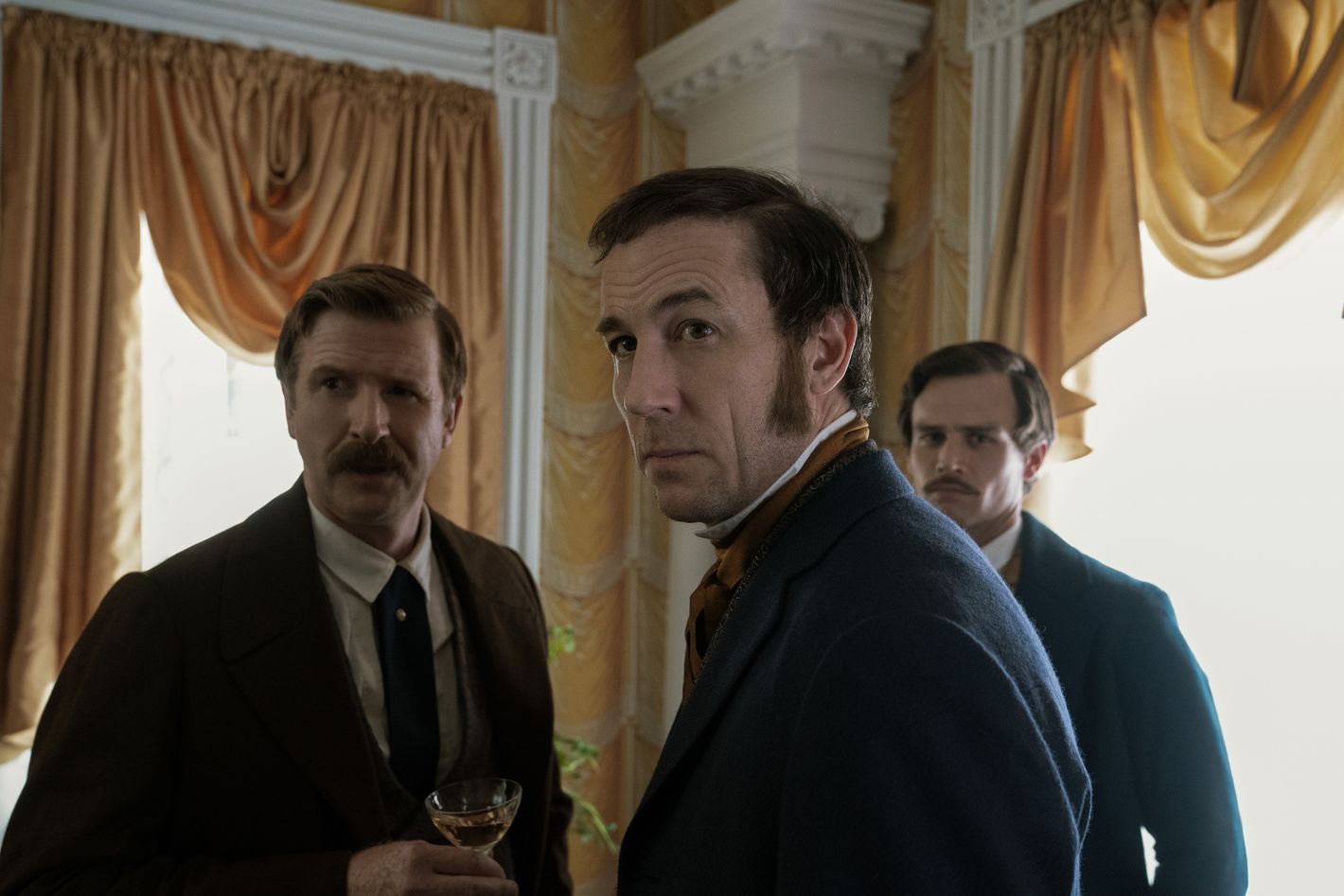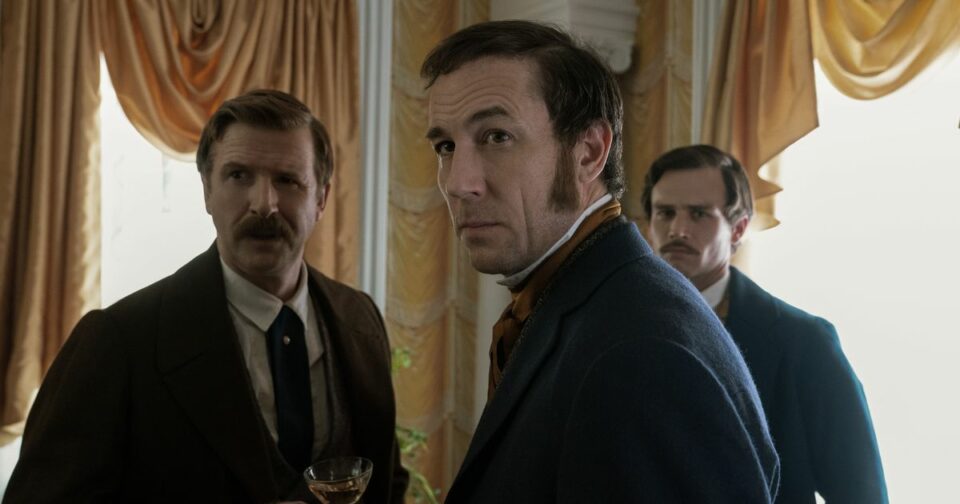[ad_1]

As the title suggests, “The Final Act” marks the end of Manhunt’s story, yet it opens at the beginning. As the episode begins, three years before the main action, we get a kind of origin story for Lincoln’s relationship with Stanton. After agreeing to be War Secretary — Lincoln’s “Mars,” as the President puts it — he attends a party held by the Lincolns. It’s there he meets Elizabeth Keckley, who wastes little time telling him Lincoln needs another voice whispering in his ear about Emancipation. Can she spot an ally that easily, or does Stanton’s progressive reputation precede him?
It’s also there that Stanton finds Lincoln by the deathbed of his son Willie, though he doesn’t contradict Willie’s doctor when he reassures Mary that Willie will recover. Manhunt has offered suggestion after suggestion that Mary Todd Lincoln’s madwoman reputation is a distortion of history by depicting the ways she and, by extension, all women were sidelined and condescended to. This is another one. And, if she were mad, who wouldn’t be driven a bit mad after being told their dying child was sure to get better, and soon?
From there, it’s back to the business of dealing with those who conspired to assassinate Lincoln, the “trial of the century,” as the newsboys dub it, outside the courthouse. It’s there that Stanton tries to create the narrative he wants: that this trial should be seen as a chance for the nation to unite and move past the assassination and the events of the war. But first, the trial has to go as planned. That job falls to Seward, whose own attack is tied up in the events surrounding Lincoln’s assassination, but, as this is a military tribunal prosecuting the murder of the President of the United States and Secretary of State, he’s the man for the job. He also has a surprise: In addition to a rogues gallery of Herold, Mudd, Mary Surratt, and the other expected alleged conspirators, he accuses Jefferson Davis.
Where’s this coming from? (It should be noted that it does not come from history.) Seward is emboldened to make the accusation because of a conversation between Stanton and Davis that is held in Davis’s cell. It’s there that Davis insists that the Confederacy is not dead. In fact, he still plans to claim the White House for the South. What’s more, Baker has intel from Conover (a.k.a. Wallace), who wants to tell the truth now that he’s been outed as a double agent. Specifically, he’s heard talk of a connection and has a document called the “Pet Letter,” a letter in which he allegedly calls Booth his “pet.” This makes Conover the star witness, per Stanton’s logic.
He might need one, too. Coaching Mary, he emphasizes how the defense might lean on prejudice in an attempt to discredit her, as it does other Black witnesses. Meanwhile, both Mudd’s white neighbor and another Black witness testify to the doctor’s good character as Mary looks on. Rather than walk away, Mary turns to her brother Milo (Antonio J. Bell), who suffered mightily under Mudd. In fact, he has Mudd to thank for his disability, having angered his former master enough for him to shoot Milo in the thigh.
Milo’s testimony sets the stage for Mary to take the stand, where she recalls Mudd railing against Lincoln and expressing the desire to kill him. What’s more, Mudd used to have visitors, such as John Surratt. The defense pushes back, asking Mary why she didn’t leave, stopping her before she can show the scars from Mudd’s assault, and noting her lack of (formal) education. In frustration, she asks them to turn to another witness to back her up.
That’s Louis Weichmann, who needs a push from Mary to tell the whole story. “I just feel like there’s something you’re not saying much about,” she tells him. What that “something” is becomes apparent on the stand. Weichmann was close to John Surratt, close enough to have seen him associate with all the other conspirators. What’s more, they were more than friends. Though Weichmann doesn’t explicitly say they were lovers, stating that they shared a bed makes it clear enough to stir rumbling in the courtroom. We are, at this point, deep into the realm of invention. C.J. Hoff has been as convincing as Weichmann whenever he’s shown up all season. It works dramatically, even if putting this in an essay for history class would not earn you a good grade.
Nor would going with Conover’s story. Yes, Conover really made deep connections between Booth and officers of the Confederacy on the stand but what’s depicted here as a discrediting lapse in memory (seemingly paid for by Sanders) was actually revealed to have been wholesale perjury. But like JFK before it, Manhunt’s less interested in getting all the facts right than presenting what Oliver Stone called a “countermyth.” We’ve received romantic stories shoring up the myth of the Lost Cause, the nobleness of the Confederacy, the kindness of some slave owners and the contentment of those they enslaved, the true reason for the war being something othet than slavery, for years. (The story of Samuel Mudd as a good doctor in the wrong place at the wrong time is a prime example of how these stories insinuate themselves into the culture.) Booth has also been presented as a rogue agent, not someone with ties — loose or otherwise — to those connected to the Confederacy. Manhunt has attempted to act as a corrective. Its grasp of the facts has been a bit loose at times, but this would hardly be the first Civil War story to seek a deeper truth in legend.
In the end, the conspirators are all convicted, but the prosecution cannot create a convincing case for a grand conspiracy. This clearly irks Stanton as he talks to reporters but the conspirators hang anyway. That leaves a couple of unanswered questions, however. Why, Eckert and the National Archives would like to know, are eight pages missing from Booth’s diary? That’s been hanging over Manhunt since the final scene of the preceding episode, and now Stanton is forced to explain it to his trusted lieutenant. Or perhaps not. Stanton sends him to Baker but Eckert already knows Stanton burned the pages, telling him he had his hearth cleaned for him without saying exactly why.
So what is up with that? The question hangs over a gathering for Elizabeth Keckley’s new book, a gathering also attended by Oliver Howard (Eric Mendenhall), soon to found Howard University. But he’s currently using the chance to warn Stanton that Johnson is up to something. That “something” is soon made clear. He’s replacing Stanton. And he’s not going to be nice about it, either. What’s more, he’s going to pull Stanton’s men from the South and take over Reconstruction efforts.
Or he can at least try to remove Stanton. Instead, after flashing back to a conversation with Lincoln about the importance of his Reconstruction efforts, Stanton bars himself in his office. And as wild as this might seem, it did happen (albeit under more complicated circumstances than depicted here), and the attempt to remove Stanton played a heavy role in Johnson’s impeachment.
Fast-forwarding past all that, Manhunt then moves to four years in the future, when a badly ailing Stanton has been confirmed to the Supreme Court, only to die before being able to take office. “We finish the work now,” he says, almost certainly speaking to Lincoln. “We have to.” But it’s those watching he’s really speaking to.
Codes and Clues
• So what about those missing pages? We never really get an answer, which is, honestly, a bit odd. Presumably, there’s something incriminating about Stanton or Lincoln, perhaps tied to the Dahlgren Letter, but why would Booth have that kind of information? It feels strange for Manhunt to end an episode teasing this moment’s significance and then just kind of let it hang there.
• It’s a frustrating element of a good but somewhat anticlimactic final episode, which kind of rushes through the trial, the collapse of the grand conspiracy charge, and Johnson’s attempt to remove Stanton and suffers a little from the absence of Booth. That said, “The Final Act” almost plays like a mystery in which we learn the true villain in a final twist and it’s Andrew Johnson. And, for all its factual corner-cutting, Manhunt makes a pretty good case that history might have swerved in a better direction without Johnson’s revised take on Reconstruction.
• All in all, this was a gripping and thoughtful series. Is there a way to follow it up? Manhunt takes its title from the James L. Swanson book that inspired it, but there are always other manhunts to dramatize. Or, as the flashbacks confirm, Hamish Linklater and Lili Taylor are both terrific as the Lincolns. Or maybe put the focus on Betty Gabriel’s Elizabeth Keckley, a historical figure with a story worth telling.
[ad_2]
Keith Phipps , 2024-04-19 14:00:47
Source link



